A review of the salaries of testers or is it worth it to work for food?
In the material world material values rule. And no matter how we hide our salary expectations under the correct wording about the importance of the team, the interest of the tasks and the possibility of self-realization, we are looking for the line about the possible income in the job description first. At the same time, we ourselves often tend to expect more, be sure to be disappointed in receiving “cheap” offers or not finding offers with the desired level of wages.

My path in testing began with the basics and I, gaining knowledge and experience, step by step climbed the career ladder. It is logical that at the very beginning of the way they paid little. But I understood that first you need to "pump", expand your knowledge and skills, so I gradually went to the intended goal. Now, having achieved the desired, I, having experience in QA for over six years and seeing what difficulties my colleagues face, decided to study the money issue in our market.
In my previous article, Hiring Testers - On Both Sides of the Barricades“The financial issue was briefly touched upon, but, as the feedback showed, it was he who turned out to be the most interesting. Therefore, I decided to study the salary market of testers, and thereby help my colleagues compare their expectations with reality. In the end, it was just interesting to learn about how our brother lives.
I conducted a sociological survey using the CAWI (Computer Assisted Web Interviewing) survey technique - a survey using the Internet. I must say right away that it cannot be considered an absolute truth: it is not based on complex mathematical models, it has a small sample. Therefore, with the conclusions, I tried to be more careful.
How to relate to its results is up to you. But at the moment this is the best we have. Unfortunately, there are practically no studies on salaries in our sphere, especially over the past year. This is probably due to the fact that testers are not numerous and it is difficult for serious sociological services to spend time and energy researching a relatively small professional group. But as time shows, this question is topical and requires immersion. So, take a deep breath and dive deeper.
The survey involved 373 respondents, two of whom work on freelance work, and the rest are office workers, more than two-thirds of whom work full-time. But at the same time, 99.5% of respondents are on full-time (hereinafter, the results will be given in percent).
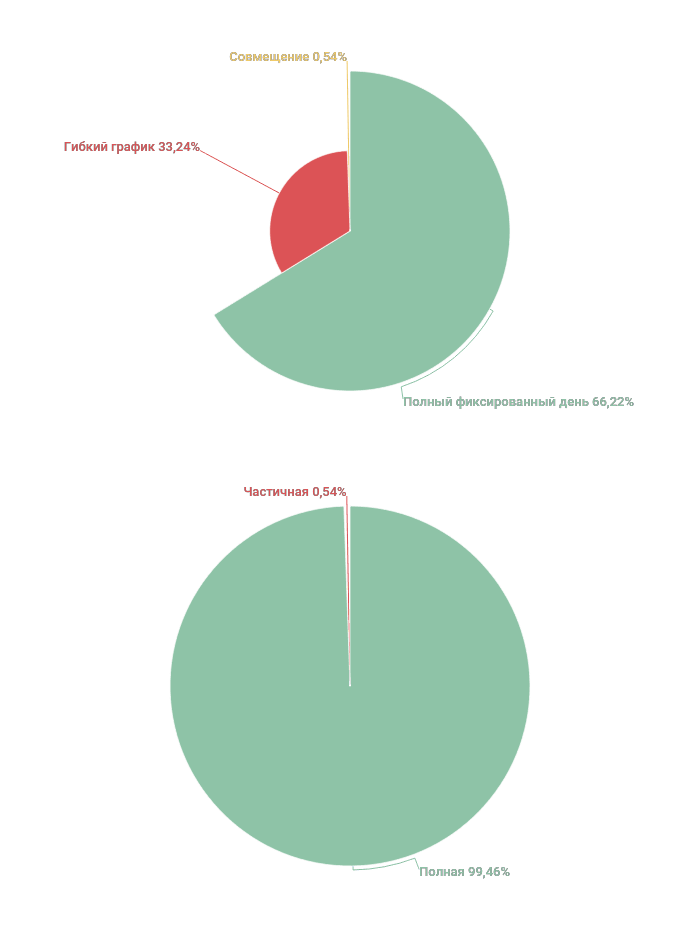
Experts from Russia, Ukraine, Belarus, the USA, Great Britain, Poland, Germany, Israel, as well as representatives of multinational companies answered my questions.
Another cut is the size of the companies in which the respondents work. So, 34% of respondents represent very large companies with more than 500 employees, 28% of large firms. Of organizations with a staff of up to 100 people received 18% of the responses from the total amount, about the same number - 17% - employees from small companies (up to 50 people). Finally, a very small employer with staff of 10 or less represents 1.5% of the respondents.
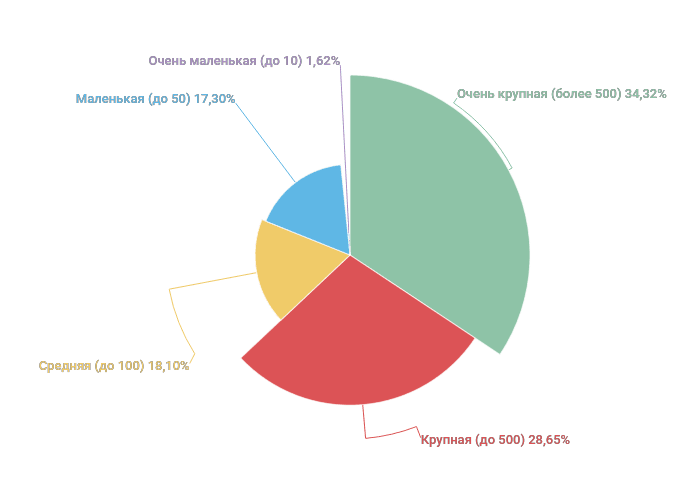
And what about the professional areas of the companies in which our respondents work?
23% represent the financial sector (financial services or banks), 16% each represent e-commerce and integrators, 14% represent telecommunications, 9% represent web studios and agencies, and further decrease:

If we consider the total experience in testing among respondents, then the picture is as follows:

89% of our respondents do manual testing, a quarter of which are partially related to automated testing. Of all the respondents, 34% are “machine gunners”. The sum of percent more than a hundred is not a quirk of mathematics, but an example of the universality of our profession: many have already mastered both methods.
Finally, almost one in five respondents is a manager, and about 5% of respondents “release” themselves. But the most amazing thing that emerged during the study: every 25th is already immersed in DevOps (4%).
Now that each of us can draw a portrait of a participant in our survey and transfer it to ourselves, we will move on to the most “delicious” one - the results of the study.
So, I “hacked” Dudya and asked my colleagues a number of questions regarding their salary, additional motivation, satisfaction with the place of work and income. And this is what we got.
Salaries in the IT labor market vary greatly: the lower and upper boundaries of the “plug” of remuneration in one city can differ several times. C'est la vie, as the French say. But the general picture is this:
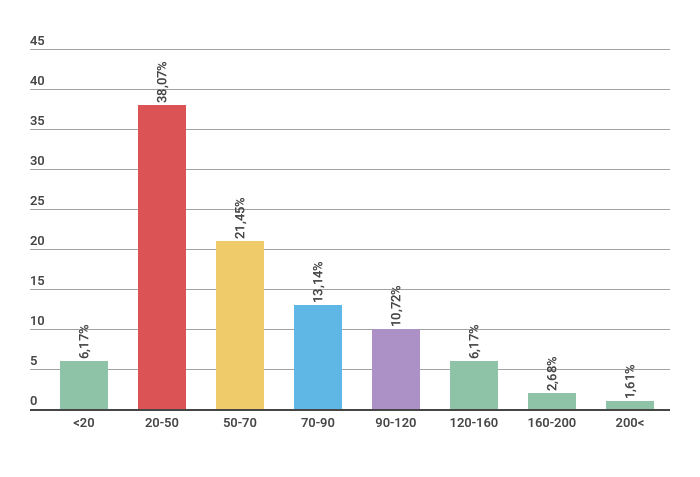
Thus, the majority of respondents receive a salary in the range of 20-50 thousand rubles. And this is not the lowest income: about 6% of respondents earn less than 20 thousand rubles. And further downward - the higher the income, the less lucky.
And what about additional motivation?
Surprisingly, in more than half of the respondents, the results of the work do not affect the additional promotion.
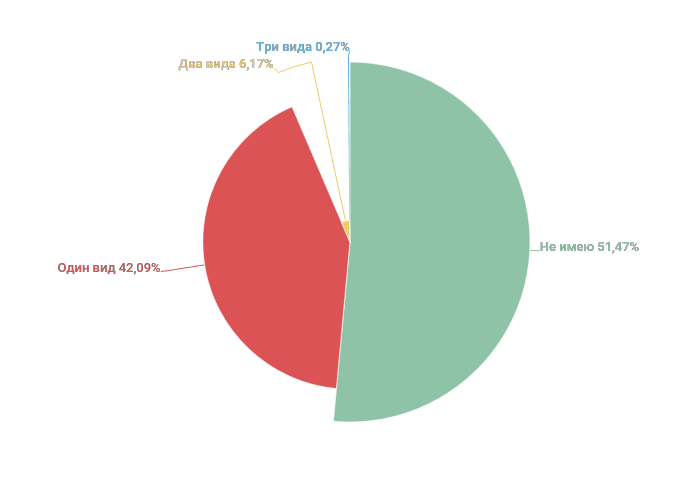
What types of motivation is this? As a rule, the employer provides a monthly increase, a quarterly bonus or an annual bonus. As we can see, most are encouraged by just one kind. Less often, an employee receives two types of motivation. Incredibly, there was even one respondent who bathes in a pool of money, receiving increases every month, quarter and year!
But then a comparison suggests itself, not just the income level, but its size as applied to the place of residence. Quite often, communicating with colleagues from other regions, you can hear the phrase that they, performing functional work activities similar to an employee of the Moscow or St. Petersburg office, receive several times less.
Consider the correlation of the level of wages depending on experience and region.
The bulk of those working in the capital, whose salaries vary from 20 to 50 thousand rubles, have less than a year of experience, and are mainly engaged in manual testing. In the Northern capital, approximately the same number of employees with less than a year of experience and 1-3 years of experience receive this salary. The bulk of Petersburgers are also involved in manual testing. In the regions, fewer specialists receive the same salary than in the capitals, and at the same time they are engaged in manual testing and have experience of up to a year.
The most popular salary from QA specialists is from 50 to 70 thousand rubles. If we consider Moscow and St. Petersburg, the bulk of the employees who receive such income have 1-3 years of experience and are engaged in manual testing, but in St. Petersburg there are those who combine manual testing with management. A similar picture of salary (1-3 years of experience, manual testing) is emerging in the regions.
The level of salary from 70 to 90 thousand rubles for manual testers is very common in the capitals with an experience of 1-3 years, but few receive such a salary in the regions, and that is subject to a longer experience.
And if a salary of 90 thousand rubles and higher can be obtained in Moscow only by manual testing, then in the regions the requirements are higher: a comparable level of income requires automated testing skills. True, the situation is balanced by the fact that for a higher salary in the region less experience will be needed, albeit in a more complex form of testing.
But there is never much money, and in a situation where salary expectations have not been met, some begin to search for sources of additional income. Given that the tester is a rather lazy creature, it’s scary to imagine how much his salary has ceased to satisfy him, that he began to look for a side job! However, we will talk about the correlation between the size of income and satisfaction with it a little later.

Among sources of additional income, the respondents noted a part-time job that was not related to professional activity, consulting services / coaching, and, in fact, work in the profession.
According to the survey, the main motivational component of additional earnings among QA-specialists are low salaries, high costs, the need to repay the loan / mortgage. The following are hobbies, fans, habits, satisfaction of their own intangible interests. But improving skills and gaining additional experience are the motive for the smallest group of respondents.
Does the extra income strongly affect the overall budget? As we can see on the chart, the side job for the majority of respondents who have it is less than 1/3 of the main salary.
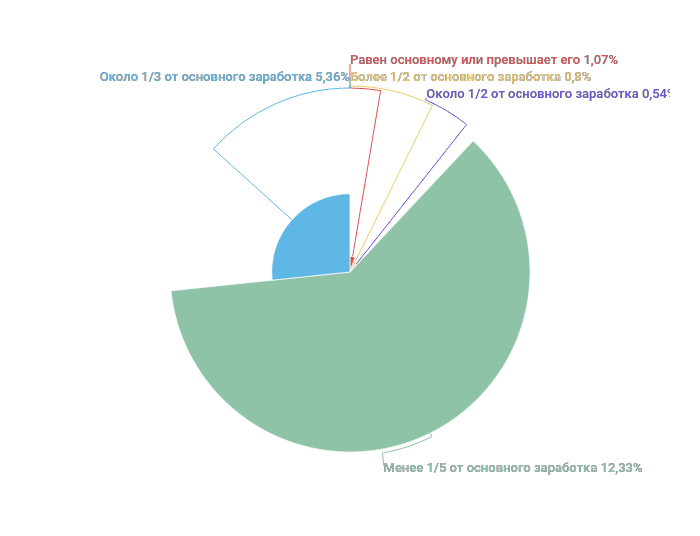
But with rare exceptions, when a side job is a hobby and a way to improve your skills, a specialist is not looking for extra income from a good life. Of course, the ideal option is to work less, while earning more. And a flexible schedule would suit many. That is human nature.
However, the loyalty of working conditions depends on the scope of the company. The survey showed that it is most likely to give testers the freedom to choose the time of work for firms working in the areas of logistics and recognition.
Close to them in terms of working liberties of the company from the fields of medicine, education, E-commerce and software development. Employers from outsourcing firms, product development, search engines, manufacturers of electronic directories and maps also have free schedules. Strictly from 9 to 6, testers working in the field of public services and tourism will have to work.
But we must understand that the size of income does not mean anything without reference to satisfaction with it. Therefore, I asked the respondents an intimate question: are they satisfied with their income level?

As we see (and note with regret), more than half of the brothers in the workshop interviewed by me do not feel much happiness on payday. And if you add doubters to them (and doubts are always a reason to think), then the picture comes out very depressing. It's time to scroll up and remember that only 1/5 of the respondents have additional earnings. That is, even if out of them 100% of those who are dissatisfied with their salaries, all the same, more than a third of the respondents not only suffer from a lack of money, but also do nothing with it. Sad
Let's talk about whether income-generating work should be liked.
If you act contrary to your nature, work at an unloved job, stepping on your throat, then over time a person begins to feel that he is useless. This sensation, in turn, gives rise to fear and uncertainty about the future. And vice versa, if the business that you do is like and you need, you are in your place, this sense of need gives a feeling of security, confidence, and self-esteem. This is how this world works. People who can put their hearts into what they do are always needed.
Of course, the correlation between salary and employer satisfaction is very interesting. And it turns out a strange story. Judge for yourself.

It turns out that there are two times more people satisfied with their place of work than with a salary!
If you look closely, the connection is interesting. Of those satisfied with their place of work, 28.15% are dissatisfied with the level of wages. At the same time, exactly the same 28% are satisfied with their place of work and level of wages! It is amazing how the opinions of those who are satisfied with their place of work were divided into two camps.
An interesting fact: of those who were satisfied with their place of work, the salary level was not satisfied with two employees from large e-commerce: one from Moscow, a handbrake / automation engineer, with average work experience receiving 120-160 thousand rubles, and the second from Kiev, with little experience, with an income of 50-70 thousand rubles.
Finally, 4% were unsure of either income or place of work.
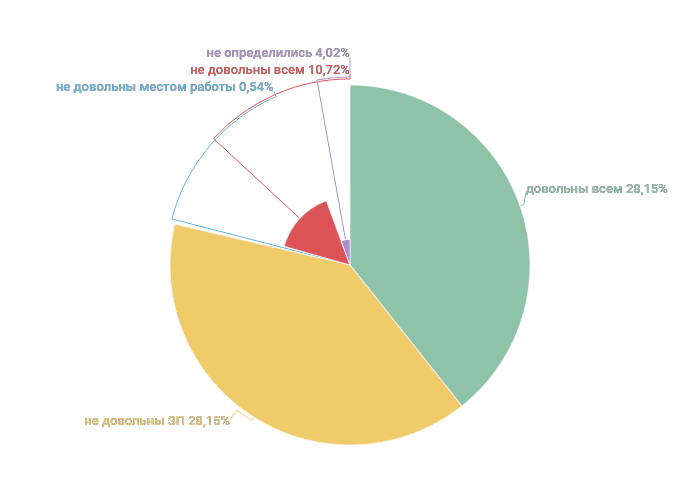
It would be interesting to know about your satisfaction with your salary, work, and in general thoughts about how we should be next. Waiting for your comments!
As I said above, the survey does not allow us to compose a very objective picture. But some conclusions can be drawn at least from the available data.
The fact that the respondents were divided into two equal camps from those who like work / do not like salaries and those who are satisfied with everything leads to an interesting idea.
It's no secret that in life you always have to compromise. As in a famous parable, we have to choose between a pipe and a basket, trying to find the best option by trial and error. And the results of the survey show that we often make a choice between a good team, interesting work and big money.
As for me, I'm probably lucky. I work in a large web agency that implements ambitious tasks, adequately paying for my work. Recently, we have grown a lot and belong to large companies. Our team is not going to stop there, we are developing and expanding, we have many interesting and bold projects that need fresh brains and professional talents. Therefore, if you are ready for new achievements and want to try your luck, then Wellcome!)
Well, the urge to earn more money is highly praised. At the same time, salary expectations should be based not only on personal Wishlist, but also on a certain level of professionalism and experience. Unfortunately, the desire to get everything and immediately often leads talented young testers to non-core areas with a higher income level, creating a shortage of personnel in our market.
Therefore, I would like to wish only that, when choosing an employer, novice specialists prioritize companies that, first of all, offer interesting tasks. Because the key to both career and financial growth lies in the availability of experience and skills that can be obtained only by tackling complex tasks. Work for yourself and your future and be sure to get what you want!
The survey results themselves for those interestedhere .

My path in testing began with the basics and I, gaining knowledge and experience, step by step climbed the career ladder. It is logical that at the very beginning of the way they paid little. But I understood that first you need to "pump", expand your knowledge and skills, so I gradually went to the intended goal. Now, having achieved the desired, I, having experience in QA for over six years and seeing what difficulties my colleagues face, decided to study the money issue in our market.
In my previous article, Hiring Testers - On Both Sides of the Barricades“The financial issue was briefly touched upon, but, as the feedback showed, it was he who turned out to be the most interesting. Therefore, I decided to study the salary market of testers, and thereby help my colleagues compare their expectations with reality. In the end, it was just interesting to learn about how our brother lives.
I conducted a sociological survey using the CAWI (Computer Assisted Web Interviewing) survey technique - a survey using the Internet. I must say right away that it cannot be considered an absolute truth: it is not based on complex mathematical models, it has a small sample. Therefore, with the conclusions, I tried to be more careful.
How to relate to its results is up to you. But at the moment this is the best we have. Unfortunately, there are practically no studies on salaries in our sphere, especially over the past year. This is probably due to the fact that testers are not numerous and it is difficult for serious sociological services to spend time and energy researching a relatively small professional group. But as time shows, this question is topical and requires immersion. So, take a deep breath and dive deeper.
Portrait of a tester: employment, place of work, experience
The survey involved 373 respondents, two of whom work on freelance work, and the rest are office workers, more than two-thirds of whom work full-time. But at the same time, 99.5% of respondents are on full-time (hereinafter, the results will be given in percent).

Experts from Russia, Ukraine, Belarus, the USA, Great Britain, Poland, Germany, Israel, as well as representatives of multinational companies answered my questions.
Another cut is the size of the companies in which the respondents work. So, 34% of respondents represent very large companies with more than 500 employees, 28% of large firms. Of organizations with a staff of up to 100 people received 18% of the responses from the total amount, about the same number - 17% - employees from small companies (up to 50 people). Finally, a very small employer with staff of 10 or less represents 1.5% of the respondents.

And what about the professional areas of the companies in which our respondents work?
23% represent the financial sector (financial services or banks), 16% each represent e-commerce and integrators, 14% represent telecommunications, 9% represent web studios and agencies, and further decrease:

If we consider the total experience in testing among respondents, then the picture is as follows:
- less than 1 year of experience have a quarter of the total number of respondents;
- from 1 to 3 years - 43%;
- from 3 to 6 years - 23%;
- from 6 to 10 years - 7%;
- from 10 years of experience in testing have 2% of respondents.

89% of our respondents do manual testing, a quarter of which are partially related to automated testing. Of all the respondents, 34% are “machine gunners”. The sum of percent more than a hundred is not a quirk of mathematics, but an example of the universality of our profession: many have already mastered both methods.
Finally, almost one in five respondents is a manager, and about 5% of respondents “release” themselves. But the most amazing thing that emerged during the study: every 25th is already immersed in DevOps (4%).
Now that each of us can draw a portrait of a participant in our survey and transfer it to ourselves, we will move on to the most “delicious” one - the results of the study.
Testers salary market: where to find fish places
So, I “hacked” Dudya and asked my colleagues a number of questions regarding their salary, additional motivation, satisfaction with the place of work and income. And this is what we got.
Salaries in the IT labor market vary greatly: the lower and upper boundaries of the “plug” of remuneration in one city can differ several times. C'est la vie, as the French say. But the general picture is this:

Thus, the majority of respondents receive a salary in the range of 20-50 thousand rubles. And this is not the lowest income: about 6% of respondents earn less than 20 thousand rubles. And further downward - the higher the income, the less lucky.
And what about additional motivation?
Surprisingly, in more than half of the respondents, the results of the work do not affect the additional promotion.

What types of motivation is this? As a rule, the employer provides a monthly increase, a quarterly bonus or an annual bonus. As we can see, most are encouraged by just one kind. Less often, an employee receives two types of motivation. Incredibly, there was even one respondent who bathes in a pool of money, receiving increases every month, quarter and year!
But then a comparison suggests itself, not just the income level, but its size as applied to the place of residence. Quite often, communicating with colleagues from other regions, you can hear the phrase that they, performing functional work activities similar to an employee of the Moscow or St. Petersburg office, receive several times less.
Consider the correlation of the level of wages depending on experience and region.
The bulk of those working in the capital, whose salaries vary from 20 to 50 thousand rubles, have less than a year of experience, and are mainly engaged in manual testing. In the Northern capital, approximately the same number of employees with less than a year of experience and 1-3 years of experience receive this salary. The bulk of Petersburgers are also involved in manual testing. In the regions, fewer specialists receive the same salary than in the capitals, and at the same time they are engaged in manual testing and have experience of up to a year.
The most popular salary from QA specialists is from 50 to 70 thousand rubles. If we consider Moscow and St. Petersburg, the bulk of the employees who receive such income have 1-3 years of experience and are engaged in manual testing, but in St. Petersburg there are those who combine manual testing with management. A similar picture of salary (1-3 years of experience, manual testing) is emerging in the regions.
The level of salary from 70 to 90 thousand rubles for manual testers is very common in the capitals with an experience of 1-3 years, but few receive such a salary in the regions, and that is subject to a longer experience.
And if a salary of 90 thousand rubles and higher can be obtained in Moscow only by manual testing, then in the regions the requirements are higher: a comparable level of income requires automated testing skills. True, the situation is balanced by the fact that for a higher salary in the region less experience will be needed, albeit in a more complex form of testing.
But there is never much money, and in a situation where salary expectations have not been met, some begin to search for sources of additional income. Given that the tester is a rather lazy creature, it’s scary to imagine how much his salary has ceased to satisfy him, that he began to look for a side job! However, we will talk about the correlation between the size of income and satisfaction with it a little later.

Among sources of additional income, the respondents noted a part-time job that was not related to professional activity, consulting services / coaching, and, in fact, work in the profession.
According to the survey, the main motivational component of additional earnings among QA-specialists are low salaries, high costs, the need to repay the loan / mortgage. The following are hobbies, fans, habits, satisfaction of their own intangible interests. But improving skills and gaining additional experience are the motive for the smallest group of respondents.
Does the extra income strongly affect the overall budget? As we can see on the chart, the side job for the majority of respondents who have it is less than 1/3 of the main salary.

But with rare exceptions, when a side job is a hobby and a way to improve your skills, a specialist is not looking for extra income from a good life. Of course, the ideal option is to work less, while earning more. And a flexible schedule would suit many. That is human nature.
However, the loyalty of working conditions depends on the scope of the company. The survey showed that it is most likely to give testers the freedom to choose the time of work for firms working in the areas of logistics and recognition.
Close to them in terms of working liberties of the company from the fields of medicine, education, E-commerce and software development. Employers from outsourcing firms, product development, search engines, manufacturers of electronic directories and maps also have free schedules. Strictly from 9 to 6, testers working in the field of public services and tourism will have to work.
But we must understand that the size of income does not mean anything without reference to satisfaction with it. Therefore, I asked the respondents an intimate question: are they satisfied with their income level?

As we see (and note with regret), more than half of the brothers in the workshop interviewed by me do not feel much happiness on payday. And if you add doubters to them (and doubts are always a reason to think), then the picture comes out very depressing. It's time to scroll up and remember that only 1/5 of the respondents have additional earnings. That is, even if out of them 100% of those who are dissatisfied with their salaries, all the same, more than a third of the respondents not only suffer from a lack of money, but also do nothing with it. Sad
Let's talk about whether income-generating work should be liked.
If you act contrary to your nature, work at an unloved job, stepping on your throat, then over time a person begins to feel that he is useless. This sensation, in turn, gives rise to fear and uncertainty about the future. And vice versa, if the business that you do is like and you need, you are in your place, this sense of need gives a feeling of security, confidence, and self-esteem. This is how this world works. People who can put their hearts into what they do are always needed.
Of course, the correlation between salary and employer satisfaction is very interesting. And it turns out a strange story. Judge for yourself.

It turns out that there are two times more people satisfied with their place of work than with a salary!
Here, it would seem, it's time to grab his head and scream: "Guys, what are you doing?" But no, still I have data separately for each group of respondents that will help to discern the nuances.
If you look closely, the connection is interesting. Of those satisfied with their place of work, 28.15% are dissatisfied with the level of wages. At the same time, exactly the same 28% are satisfied with their place of work and level of wages! It is amazing how the opinions of those who are satisfied with their place of work were divided into two camps.
An interesting fact: of those who were satisfied with their place of work, the salary level was not satisfied with two employees from large e-commerce: one from Moscow, a handbrake / automation engineer, with average work experience receiving 120-160 thousand rubles, and the second from Kiev, with little experience, with an income of 50-70 thousand rubles.
As the survey data showed, one in ten testers is dissatisfied with the system: both the employer and the salary.
Finally, 4% were unsure of either income or place of work.

It would be interesting to know about your satisfaction with your salary, work, and in general thoughts about how we should be next. Waiting for your comments!
Prize or money: what to choose
As I said above, the survey does not allow us to compose a very objective picture. But some conclusions can be drawn at least from the available data.
The fact that the respondents were divided into two equal camps from those who like work / do not like salaries and those who are satisfied with everything leads to an interesting idea.
It's no secret that in life you always have to compromise. As in a famous parable, we have to choose between a pipe and a basket, trying to find the best option by trial and error. And the results of the survey show that we often make a choice between a good team, interesting work and big money.
What is more important - each of us chooses for himself, deep down hoping that one day we will find a middle ground.
As for me, I'm probably lucky. I work in a large web agency that implements ambitious tasks, adequately paying for my work. Recently, we have grown a lot and belong to large companies. Our team is not going to stop there, we are developing and expanding, we have many interesting and bold projects that need fresh brains and professional talents. Therefore, if you are ready for new achievements and want to try your luck, then Wellcome!)
Well, the urge to earn more money is highly praised. At the same time, salary expectations should be based not only on personal Wishlist, but also on a certain level of professionalism and experience. Unfortunately, the desire to get everything and immediately often leads talented young testers to non-core areas with a higher income level, creating a shortage of personnel in our market.
Therefore, I would like to wish only that, when choosing an employer, novice specialists prioritize companies that, first of all, offer interesting tasks. Because the key to both career and financial growth lies in the availability of experience and skills that can be obtained only by tackling complex tasks. Work for yourself and your future and be sure to get what you want!
The survey results themselves for those interestedhere .
